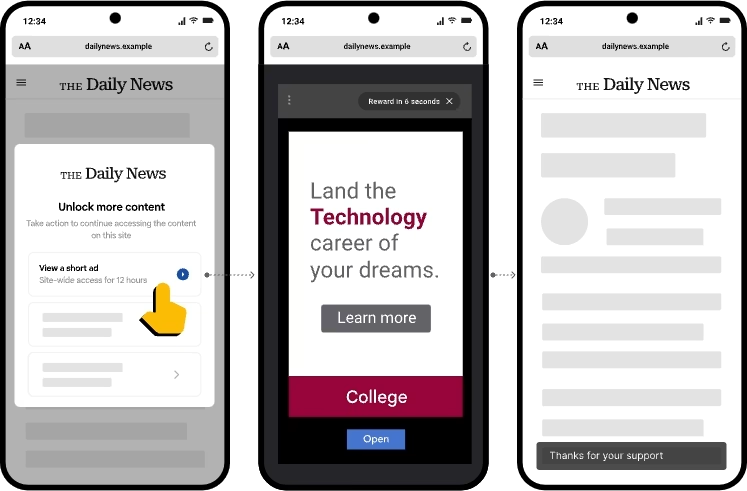The AI-Driven Shift: Google's Offerwall as a Lifeline for Publishers
It's no secret that the internet, as we've known it, is undergoing a seismic shift. For years, Google's search engine has been the undisputed king, funneling billions of clicks to publishers worldwide. But then, AI came along. And suddenly, the ground beneath many content creators started to feel a bit shaky. We're talking about a significant decline in traditional search traffic, a trend that's been a tough pill to swallow for news sites, blogs, and pretty much anyone relying on organic discovery. Recent data, for instance, suggests a pretty stark drop in Google search clicks over the last year, even as impressions might be up. It's a clear signal: AI is changing how people find information, and it's not always leading them to a publisher's site anymore.
Why Offerwall, and Why Now?
So, what's a tech giant to do when its core product starts eating into the very ecosystem it relies on for content? Google's answer, at least in part, is the newly launched Offerwall. This isn't just some minor tweak; it feels like a strategic, almost defensive, play. For a long time, publishers have been caught between a rock and a hard place: monetize with intrusive ads or erect paywalls that often deter casual readers. The AI revolution, with tools like Google's own AI Overviews providing instant answers, has only exacerbated this dilemma. If users get their answers directly from the search results page, why would they click through? They won't. And that's where the revenue dries up.
Offerwall, then, emerges as a direct response to this existential threat to online publishing. It's Google's attempt to provide a new monetization avenue, acknowledging that the old ways are becoming less effective. It's a big deal, really.
How Google's Offerwall Works for Content Access
At its core, Offerwall is about providing flexibility for content access and monetization. Think of it as a customizable gate for your content. Instead of a hard paywall that demands a subscription or a one-time payment, Offerwall allows publishers to offer users a variety of ways to unlock premium or gated content.
Here's the gist of it:
- Micropayments: For those who just want to read one article without committing to a full subscription, a small, one-off payment becomes an option.
- Surveys: Users can complete a short survey in exchange for access. This is a win-win, as publishers get valuable data, and users get content without spending money.
- Ad Engagement: Perhaps the most interesting for some, users can opt to watch a short video ad or engage with an interactive advertisement to bypass the content gate. It's a different kind of value exchange.
The Potential Impact on Publisher Revenue and Strategy
For publishers, Offerwall could be a significant game-changer. It offers a fresh stream of revenue beyond traditional display advertising, which, let's be honest, has been in decline for a while. By allowing publishers to gate content more effectively and offer varied access methods, it could help them recoup some of the losses from dwindling search traffic.
Imagine a scenario where a user lands on an article, hits a paywall, but instead of bouncing, they're presented with the option to watch a 30-second ad. Many might take that deal. It's certainly better than just losing them entirely. This tool could empower publishers to experiment with new content strategies, perhaps creating more premium, in-depth content knowing there are more flexible ways to monetize it. It's about diversifying the revenue pie, which is something every publisher I know is desperate to do right now.
Challenges and Lingering Skepticism
However, it's not all sunshine and roses. While Offerwall is a promising step, it's not without its challenges and a healthy dose of skepticism from the industry. One major question is user adoption. Will users genuinely embrace these alternative access methods? We've all been trained to expect free content online, and introducing new friction, even if it's a survey or an ad, might still lead to bounces.
There's also the underlying tension. Google is, in a way, offering a solution to a problem that its own AI initiatives have exacerbated. Some might see it as a band-aid rather than a cure. Can Offerwall truly offset the significant decline in direct traffic that AI Overviews and similar features are causing? That remains to be seen. It's a complex relationship, Google and its publishers, always has been. And this new tool doesn't magically erase years of sometimes conflicting interests.
The Broader Landscape and Future Outlook
The launch of Offerwall signals a broader shift in the digital content landscape. We're moving away from a purely ad-supported, open-web model to one that increasingly relies on direct monetization, whether through subscriptions, micropayments, or engagement-based exchanges. AI isn't just changing search; it's fundamentally reshaping the economics of content creation and distribution.
This move by Google could set a new standard for how content is monetized online. Publishers will need to adapt, experimenting with how they implement Offerwall and what content they choose to gate. It's a new frontier, and those who innovate will likely be the ones who thrive. It won't be easy, but at least there's a new tool in the shed. And in these uncertain times, any new tool is welcome.
Conclusion
Google's Offerwall is a significant development, a clear acknowledgment from the tech giant that AI's impact on search traffic necessitates new revenue models for publishers. While it offers promising avenues for monetization through flexible content access, its ultimate success hinges on user acceptance and the willingness of publishers to strategically integrate it. It's not a silver bullet, but it's a necessary evolution in the ongoing saga of how quality content gets paid for in an increasingly AI-driven world. Publishers, it seems, have another option on the table. And that, in itself, is a win.
